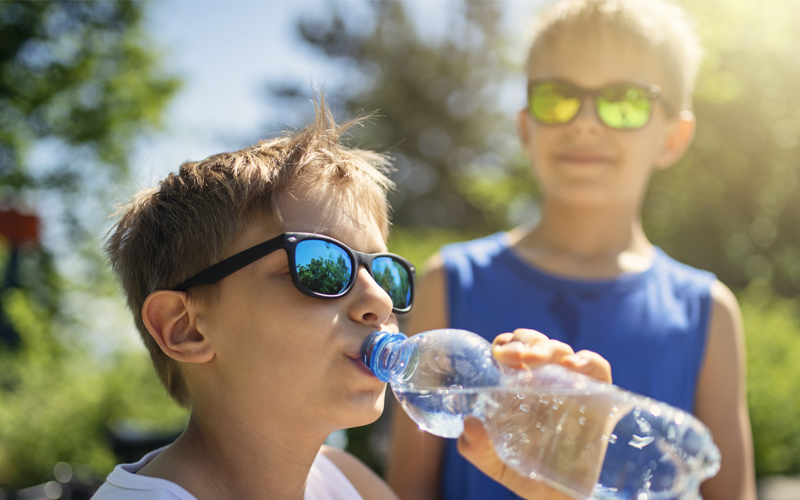
You’ve heard a friend or neighbor say, “I just can’t take the heat” on a sweltering summer day. It’s more than a saying. Hot temperatures of 90 degrees or more bring real dangers, including life-threatening emergencies like heat exhaustion and heat stroke, and they’re nothing to shrug off.
Extreme heat causes more than 1,200 deaths a year nationwide, according to the Centers for Disease Control and Prevention (CDC). The good news is that most of these deaths can be prevented with prevention, education and, when needed, quick action.
“Heat-related illnesses can become extremely serious very quickly,” says Priya Patel, MD, with Grand View Health Primary Care Hatfield. “If you have muscle pain, nausea or vomiting due to the heat, call 9-1-1 or get to an emergency room immediately.”
What are the most serious heat-related illnesses?
Heat cramps
Heat cramps are often the first sign of serious problems. These painful muscle spasms occur most often in the legs or abdomen. They can happen when you don’t drink enough water or sports drink.
“Heat cramps may go away on their own once you hydrate,” Dr. Patel says. However, if they last more than an hour – or if you’re on a low-sodium diet or have a history of heart problems – seek immediate medical attention for heat cramps at an Emergency Room near you.
Heat exhaustion
A heat-related illness becomes a serious concern when it reaches heat exhaustion. You may be suffering from heat exhaustion if you experience:
- Heavy sweating
- Nausea or vomiting
- A fast, weak pulse
- Muscle cramps
- Cold, pale or clammy skin
- Fatigue
- Headaches
- Fainting
If you or someone you know experiences the signs of heat exhaustion, call 911. While you wait for first responders, move them to a cool place, such as a shaded area or an air-conditioned spot. “Ask them to sip water and cool them off with a bath or cool, wet cloths,” Dr. Patel says.
Heat stroke
If you’re not careful, heat exhaustion can trigger heat stroke, which is the most serious heat-related illness. Heat stroke brings similar symptoms as heat exhaustion plus:
- No longer sweating
- A body temperature of 103 or higher
- Hot, red, dry or damp skin
- A fast, strong pulse
- Dizziness and confusion
“Heat stroke is a serious medical emergency and can lead to brain damage if not taken care of quickly,” Dr. Patel says. “Call 911 immediately.”
Who’s at the highest risk for heat related illness?
- Infants, toddlers and young children
- People who are overweight
- Older adults (ages 65 and older)
- People with heart disease or high blood pressure
How can I prevent heat-related illnesses?
These tips can help you stay cool and safe no matter how hot the temperature gets outside.
Watch weather reports. Look for excessive heat watches (often issued a day or two ahead of dangerous hot temperatures) and excessive heat warnings (usually issued 12 hours before the heat becomes dangerous). Terms like “excessive heat” or “extreme heat” mean that the actual air temperature – or the “real feel” air temperature (a combination of heat and humidity) – are far above normal.
Dress for the weather. Wear lightweight, light-colored, loose-fitting clothing.
Drink water even when you’re not thirsty. “Feeling thirsty is often the first sign of heat-related illness,” Dr. Patel says. Prevent thirst by drinking plenty of water. Do not drink alcohol or carbonated, sugary drinks—they often dehydrate you.
Stay in the air conditioning if possible. If you don’t have air conditioning at your home, consider going to a shopping mall, a public library or other air-conditioned spaces. Do not rely on an electric fan for cooling. They do not prevent heat-related illnesses if the temperature is in the high 90s or higher.
Plan outdoor activities carefully. If you must be outside, do so early in the morning or early in the evening when it will be the coolest. Reduce your normal outdoor exercise activity or exercise indoors in the air conditioning until the excessive heat lifts. Seek shade whenever possible.
Wear sunscreen to prevent sunscreen. Sunburn limits your body’s ability to cool itself down.
Take a cool bath or shower instead of a warm shower.
Never leave children or pets in a hot car. It takes just 20 minutes for the inside of a car to reach 109 degrees when it’s 80 degrees outside.
If you experience a heat-related illness, you can access the highest-quality emergency care locally at the Level II Adult Trauma Center at Grand View Health. Learn more about our trauma care.
